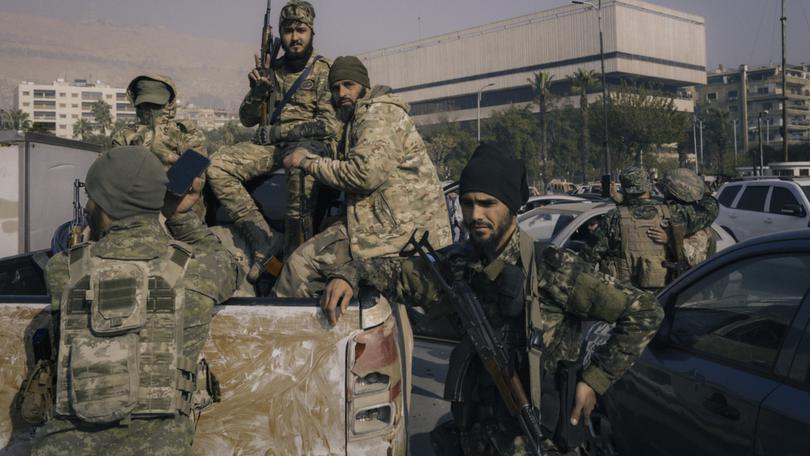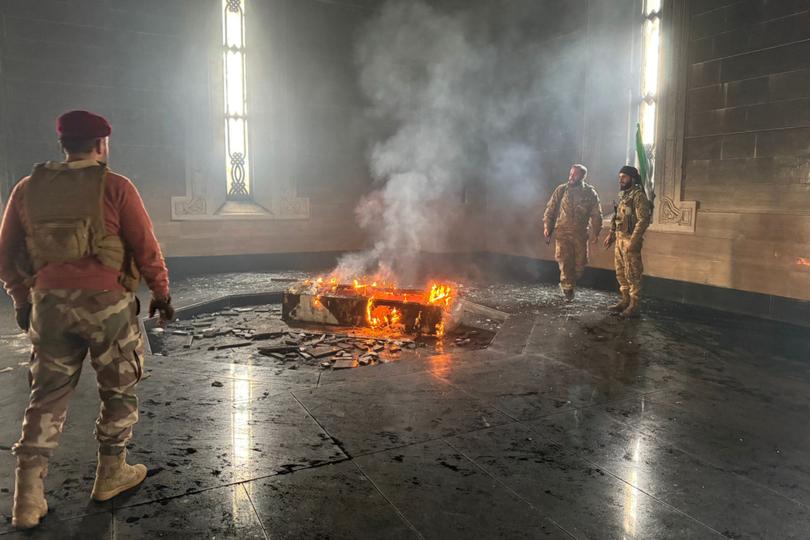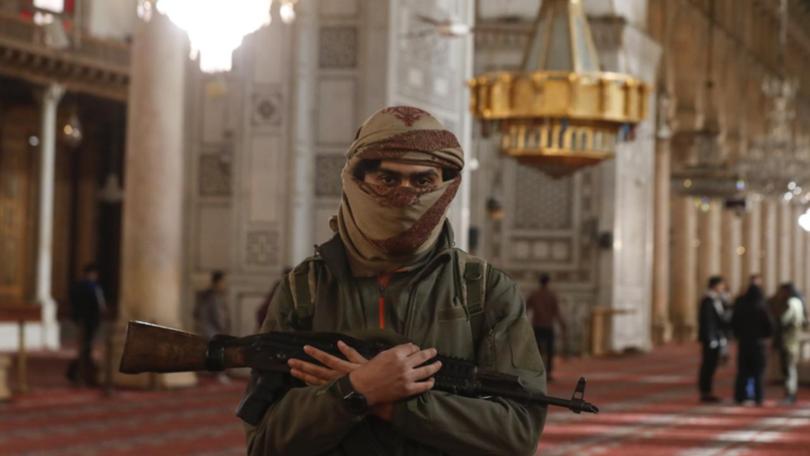After toppling the Assad regime, can Syria’s rebels rebuild a shattered state?
After sweeping into this capital city with ease, exposing the hollowness of the Assad regime after more than half a century of dictatorial rule, Syria’s rebels now face the more daunting task of governance.

After sweeping into this capital city with ease, exposing the hollowness of the Assad regime after more than half a century of dictatorial rule, Syria’s rebels now face the more daunting task of governance.
As forces from Hayat Tahrir al-Sham, the Islamist group that led the charge, advanced steadily from their home base in the north to the gates of the presidential palace, they released conciliatory messages on social media reassuring minorities they would not be persecuted and emphasizing a commitment to a Syria for all Syrians.
Now in charge of a newly hopeful but still wary nation, HTS is confronted with vexing challenges. The group will need to consolidate control over a patchwork of rebel forces and demonstrate political inclusivity, which will be key to getting relief from international sanctions. Most critically, the rebels must allay public fears that they will seek to replace Assadism with their own form of absolute rule.
Sign up to The Nightly's newsletters.
Get the first look at the digital newspaper, curated daily stories and breaking headlines delivered to your inbox.
By continuing you agree to our Terms and Privacy Policy.For now, the group’s political plan revolves around exporting its government from Idlib - the northern province where it built up organizational power in recent years - to Damascus. It is too soon to tell how HTS’s model of local administration will translate on a national scale, as it expands its area of control from a small, conservative Sunni Muslim enclave to a vast swath of territory home to many sects and ethnicities.
Even in Damascus, the newcomers are still mostly unknown. At a store selling freshly printed Syrian revolutionary flags Wednesday, shopkeeper Fadi al-Mously couldn’t name the country’s new prime minister, Mohammed al-Bashir, appointed by HTS this week.
Whoever he is, “we don’t want him,” Mously said. “We want elections.”
Outside the Interior Ministry, the police guards were all from Idlib and wore patches with the insignia of the Islamist government there. They conferred on who was now in charge.
“Is there a minister?”
“Yes, there is a minister”
“Who is our minister?”
It was Mohammed Abdulrahman, formerly the interior minister of HTS’s “Salvation Government” in Idlib, now installed as interior minister for all of Syria. His media adviser, Ahmed Badawi, confirmed he would stay in the role until elections next year.
There will be “coordination” with elements from the old regime, Badawi said. “We didn’t come to take rule, the government is for all Syrians,” he added.
Assad’s old police forces are nowhere to be seen on the streets of Damascus, though HTS officials are trying to get some of them back. Those who defected will be given priority, Badawi said.
Within 48 hours of taking the capital, Abu Mohammed al-Jolani, HTS’s self-styled commander in chief, ordered the entire public sector back to work.

As employees grappled with whether to return, there were more pronouncements: thousands of political prisoners were being released; the central bank would resume operations and deposits would be secured; amnesty would be granted to military conscripts.
“They gave all the right signals, but the first diversion from that message was the appointing of the Salvation Government prime minister to lead the transition,” said Haid Haid, a Syrian columnist and consulting fellow at Chatham House, a London-based think tank. The meeting Monday between Jolani, Bashir - his handpicked prime minister - and Assad’s former prime minister sounded more like a “takeover,” Haid said, “than a discussion to create a coalition of actors to run the country.”
Aleppo, which Jolani’s forces captured a week before entering Damascus, offered a first glimpse of HTS governance. Services were quick to resume and, just as rapidly, billboards appeared showing the faces of Syria’s new ministers, imported from Idlib, alongside messages vowing security and stability.
The same HTS technocrats sent to Aleppo are now in Damascus, tasked with rebuilding Syria’s beleaguered state institutions. In a bid to maintain continuity, HTS has kept some old ministers in place and asked their staff to return to work.
A meeting Tuesday aimed at merging the Salvation Government with remnants of the Assad regime was “an important opportunity to exchange ideas,” said Abdul Sattar Al Ali, an import from Idlib’s Water Ministry. “We are working on plans to enhance efficiency and rebuild trust between citizens and the state … but we face many challenges.” Corruption and the inefficiencies of a bloated and bureaucratic public sector were chief among them, he said.

HTS is expected to name cabinet members Thursday - a pivotal test of whether the group will follow through on its promises of pluralism.
Secretary of State Antony Blinken said Tuesday that the U.S. government will “recognize and fully support” a future Syrian government if it was the result of an inclusive and transparent transition. In a statement, Blinken called for a “Syrian-led and Syrian-owned political transition.” Recognition from Washington is critical for the country, which has been crippled by years of Western sanctions.
HTS will need to show it is willing to give political representation to Syria’s diverse sects and minorities, as well as to the array of rebel groups that contributed to Assad’s fall. Jolani said Wednesday that he had met with military commanders and factions from southern Syria - the first forces to reach Damascus - and will include them in the new Defense Ministry.
While HTS seems firmly in control for now, and many Syrians appear willing to give the group a chance during the transition period, analysts say its governance in Idlib has fallen short of democratic standards.
“People have complained that they are not able to participate or shape the policies that are implemented in [HTS] areas,” Haid said. “It’s a top-down approach that has led in many places to protests against the group. Elections were held, but they were not viewed as legitimate.”
HTS was formed as an offshoot of al-Qaeda during the early years of the Syrian civil war. Though it has sought to distance itself from its jihadist origins, extremists and foreign fighters remain among its ranks, and it is unclear whether Jolani will be able to restrain them from taking revenge on members of the old guard. The group is still under a U.S. terror designation and is likely to face deep skepticism from the incoming Trump administration.
Jolani is “delusional” if he thinks “the world and Syria’s neighbors will support his HTS-dominated ‘salvation government’ as it imposes a transitional government on all of Syria,” Joel Rayburn, who works on the president-elect’s national security transition team, wrote this week on X.
A key question will be what role Jolani - described by observers as a political opportunist and master of self-reinvention - will play in the new government, said Aaron Zelin, a fellow at the Washington Institute for Near East Policy.
“Even though they’ve had this civilian technocratic-led government over the years, HTS still has had the final decision,” Zelin said. Whether Jolani will insist on being the ultimate decision-maker, or agree to recede into the background, will go a long way toward determining Syria’s future, he added.
For now, officials say they are focused on practicalities: distributing bread, finding fuel for buses and working to get cash flowing again.
“The vast majority of people want economic stability and security, said Karam Shaar, a political economist and nonresident senior fellow at the New Lines Institute. “The main challenge HTS will face … is convincing people they are better off” under its rule.
---
Cheeseman reported from Beirut. Louisa Loveluck in Aleppo contributed to this report.
© 2024 , The Washington Post
